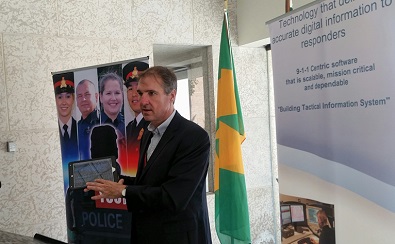Select police officers in the province will be the first in North America to try a new tactical tool.
On the weekend, Prince Albert Police Service will test a digital dispatching system that puts information at their fingertips in a crisis.
When police face threats like active shooters or bomb scares, the first step is a briefing to get important information. This includes getting aerial views, who’s involved, how to contain a threat, maps, least-travelled routes, knowing how to evacuate and more.
As an incident commander who is in charge when situations like this happen, Staff Sergeant Dave Schluff explains how critical it is to get a lay of the land in high-risk situations.
“The officers are going into a lot of unknowns, and it’s very, very helpful if you can take those unknowns away and make them known to the police officers,” he said.
In an effort to streamline the process to quickly get that information out to emergency responders, the Government of Saskatchewan partnered with the company Advance Property Exposure (APX).
What resulted is a program that searches building information (maps, photos, entrances and exits) while a 9-1-1 call is happening and uploads it to smartphones and tablets of police officers.
“That would be a library, so all that asking, all that searching, all that getting people to help you is now gone and you have it all right away and it saves a lot of time. And time may mean lives, “ Schluff said.
The system, called Building Tactical Information System (BTIS) will be put to the test for the first time in Saturday.
Police chose a school to do that. Carlton Comprehensive High School is the biggest high school in the province so it will present a challenge to police personnel, Schluff said.
He’ll be in charge of the first use of this technology in the training exercises with Prince Albert SWAT and patrol teams.
APX, the company behind the tactical tool says it’s secure, and is used by police cell phones and tables.
The BTIS was developed under funding from the Defense Research and Development Canada, as is its fire evaluation.
APX’s president and founder, Paul Martin, said by getting real data from the police department, they can learn and get better.
The technology and equipment will stay with PAPS for the next two years.
